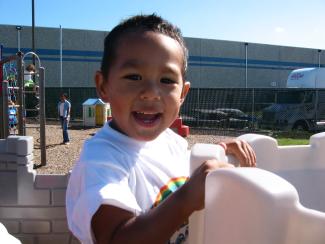
Celebrating Children’s Rights
November 18, 2011

Since 1954, the United Nations (UN) has observed November 20 as “Universal Children’s Day,” a day to honor children and promote activities for their welfare. On this day in 1959, the UN General Assembly adopted their Declaration of the Rights of the Child. On this date in 1989, these rights became legally binding to all UN member countries that ratified the Convention on the Rights of the Child, which at present includes all member countries except Somalia and the United States. However, not all countries act equally on the goals of the Convention—many signatories are not taking proactive steps, while the United States, who has not signed, may even be doing more on some fronts.
The basic premise of the Convention is that all children are born with fundamental freedoms and inherent rights, and the principles held within it further UN goals of protecting children’s rights, including expanding opportunities to advance children’s potential as well as meeting their basic needs. Like human rights in general, children’s rights are based on respect for each individual’s dignity and incorporate civil, cultural, economic, political, and social rights. Article 28 of the Convention outlines very specific goals for children’s educational opportunities:
1. States Parties recognize the right of the child to education, and with a view to achieving this right progressively and on the basis of equal opportunity, they shall, in particular:
(a) Make primary education compulsory and available free to all;
(b) Encourage the development of different forms of secondary education, including general and vocational education, make them available and accessible to every child, and take appropriate measures such as the introduction of free education and offering financial assistance in case of need;
(c) Make higher education accessible to all on the basis of capacity by every appropriate means;
(d) Make educational and vocational information and guidance available and accessible to all children;
(e) Take measures to encourage regular attendance at schools and the reduction of drop-out rates.
2. States Parties shall take all appropriate measures to ensure that school discipline is administered in a manner consistent with the child’s human dignity and in conformity with the present Convention.
3. States Parties shall promote and encourage international cooperation in matters relating to education, in particular with a view to contributing to the elimination of ignorance and illiteracy throughout the world and facilitating access to scientific and technical knowledge and modern teaching methods. In this regard, particular account shall be taken of the needs of developing countries.
Even without having ratified the Convention, the U.S. has long had free and compulsory education for children from first grade through high school. However, we at NIEER feel that our country is missing a golden opportunity but not providing more free – although voluntary – educational services when children are younger. Full-day kindergarten programs are far from the norm throughout the country, and access to freely available prekindergarten is limited rather than universal and varies greatly from state to state. Preschool education programs can further many of the goals in Article 28, including the reduction of drop-out rates, combating chronic absenteeism, and the elimination of illiteracy. Studies have found that preschool education programs have long-term outcomes and far-reaching benefits beyond school success, including financial stability, reducing crime, preparing U.S. military forces, and better health, all of which are in line with the UN’s vision for both children and adults.
Though publicly-funded pre-K remains the domain of state governments in the U.S., early education is gaining traction as an issue of international importance. As a recent OECD report noted the decrease in well-qualified workers globally, NIEER’s Steve Barnett responded that “far too many of our children enter kindergarten so far behind that higher education will not be within their reach, despite the best efforts of our schools to prepare them.” Recognizing the lifelong impact of early childhood education, developing nations are offering such programs, including Colombia (where NIEER is conducting a study). Early childhood education stands as one of the most effective interventions in facing the modern challenges of a global economy, a fact recognized by campaigns from both the OECD and the UN. A strong research base has demonstrated that providing access to preschool is beneficial to the society as a whole and furthers children’s rights not just in education but in other areas as well. Indeed, it can contribute to the Convention’s goals of “the full and harmonious development of [a child’s]personality” and allow a “child [to]be fully prepared to live an individual life in society.” The UN must continue to provide specific goals and technical assistance as countries work towards their vision of respecting and promoting the rights of all children.
– Jen Fitzgerald, Public Information Officer, NIEER
– Megan Carolan, Policy Research Coordinator, NIEER
About NIEER
The National Institute for Early Education Research (NIEER) at the Graduate School of Education, Rutgers University, New Brunswick, NJ, conducts and disseminates independent research and analysis to inform early childhood education policy.
